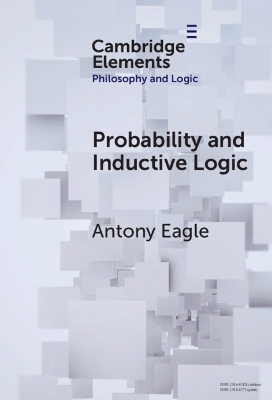
Probability and Inductive Logic
Seiten
2024
Cambridge University Press (Verlag)
978-1-009-50758-5 (ISBN)
Cambridge University Press (Verlag)
978-1-009-50758-5 (ISBN)
- Noch nicht erschienen (ca. Dezember 2024)
- Versandkostenfrei innerhalb Deutschlands
- Auch auf Rechnung
- Verfügbarkeit in der Filiale vor Ort prüfen
- Artikel merken
This Element explores the use of probability theory to provide an inductive logic framework for evaluating hypotheses. It suggests that a hypothesis's overall standing is represented by its probability based on total evidence, with incremental support indicated by a higher probability conditional on some evidence.
Reasoning from inconclusive evidence, or 'induction', is central to science and any applications we make of it. For that reason alone it demands the attention of philosophers of science. This element explores the prospects of using probability theory to provide an inductive logic: a framework for representing evidential support. Constraints on the ideal evaluation of hypotheses suggest that the overall standing of a hypothesis is represented by its probability in light of the total evidence, and incremental support, or confirmation, indicated by the hypothesis having a higher probability conditional on some evidence than it does unconditionally. This proposal is shown to have the capacity to reconstruct many canons of the scientific method and inductive inference. Along the way, significant objections are discussed, such as the challenge of inductive scepticism, and the objection that the probabilistic approach makes evidential support arbitrary.
Reasoning from inconclusive evidence, or 'induction', is central to science and any applications we make of it. For that reason alone it demands the attention of philosophers of science. This element explores the prospects of using probability theory to provide an inductive logic: a framework for representing evidential support. Constraints on the ideal evaluation of hypotheses suggest that the overall standing of a hypothesis is represented by its probability in light of the total evidence, and incremental support, or confirmation, indicated by the hypothesis having a higher probability conditional on some evidence than it does unconditionally. This proposal is shown to have the capacity to reconstruct many canons of the scientific method and inductive inference. Along the way, significant objections are discussed, such as the challenge of inductive scepticism, and the objection that the probabilistic approach makes evidential support arbitrary.
Introduction and overview; 1. Induction and inductive logic; 2. Probability and evidential support; 3. Bayesian confirmation theory; 4. Uniqueness and the problem of the priors; References.
| Erscheint lt. Verlag | 31.12.2024 |
|---|---|
| Reihe/Serie | Elements in Philosophy and Logic |
| Zusatzinfo | Worked examples or Exercises |
| Verlagsort | Cambridge |
| Sprache | englisch |
| Themenwelt | Geisteswissenschaften ► Philosophie ► Logik |
| Mathematik / Informatik ► Mathematik ► Wahrscheinlichkeit / Kombinatorik | |
| Naturwissenschaften | |
| ISBN-10 | 1-009-50758-3 / 1009507583 |
| ISBN-13 | 978-1-009-50758-5 / 9781009507585 |
| Zustand | Neuware |
| Haben Sie eine Frage zum Produkt? |
Mehr entdecken
aus dem Bereich
aus dem Bereich
ein Gegenentwurf zum kurzfristigen Denken : so werden wir zu den …
Buch | Hardcover (2023)
REDLINE (Verlag)
18,00 €


